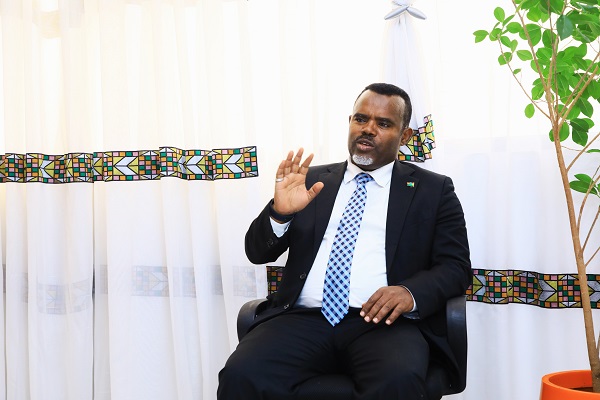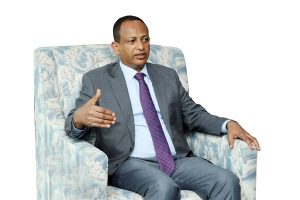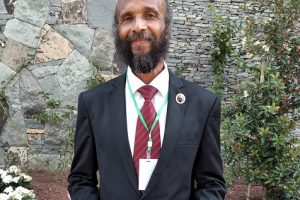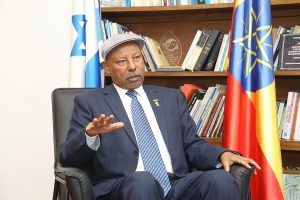
Ambassador Muktar Mohamed Ware is currently serving as Ambassador Extraordinary and Plenipotentiary at the Embassy of the Federal Democratic Republic of Ethiopia in Algiers, having recently transferred from his previous position in Mogadishu, Somalia. He has been assigned as Ambassador Extraordinary and Plenipotentiary in December 2022.
He then pursued higher education at Ethiopian Civil Service University, graduating with an LLB degree in Law as a Gold Medalist in 2003. Following his graduation, he served as the Justice and Administration Office Head in Arsi Zone and later in South Western Showa Zone, overseeing justice and security administration.
From 2005 to 2010, Ambassador Ware was elected to the Oromia National Regional State Legislative Council, where he played a role in legislative processes and served on various committees. In 2006, he transitioned to diplomacy, joining the Ministry of Foreign Affairs and serving at the Ethiopian Consulate in Jeddah, Saudi Arabia. His roles included Consul for Diaspora, Public Diplomacy, and Consular Affairs.
Ambassador Muktar returned to the Ministry’s headquarters in 2011, working as a Senior International Law expert. He earned his Master’s degree in Diplomacy and International Relations from Ethiopian Civil Service University in 2015. He has held various diplomatic posts, including assignments in Khartoum, Sudan, and Los Angeles, USA, where he also served as Acting Consul General.
During his recent visit to Addis Ababa with a delegation from Algeria, The Ethiopian Herald had the opportunity to speak with Amb. Muktar. An insightful and engaging read!
How would you describe the current relationship between Ethiopia and Algeria?
The relationship between Ethiopia and Algeria is excellent and deeply rooted in a shared historical and diplomatic legacy. Our countries have enjoyed long-standing ties since the establishment of the Organization of African Unity (now, African Union), where both played pivotal roles. His Imperial Majesty Emperor Haile Selassie of Ethiopia and President Ahmed Ben Bella of Algeria were instrumental in the founding of the OAU, and this legacy continues to define our bilateral cooperation.
We share a common vision for the advancement of the African continent, its institutions, and its people. Both nations stood shoulder to shoulder in the fight for Africa’s liberation from colonialism and have continued to collaborate in supporting the independence and development of fellow African states.
Our bilateral relations are robust, and our collaboration within multilateral forums is strong and consistent. In all spheres— political, diplomatic, and security—our partnership is strategic and based on shared Pan-African values.
However, one area where we are working to enhance our cooperation is economic diplomacy. Despite the strength of our political ties, our economic relations have not yet reached their full potential. We are committed to advancing trade, investment, and economic engagement, particularly within the frameworks of the African Continental Free Trade Area (AfCFTA) and our bilateral mechanisms.
Recently, we had the honor of welcoming His Excellency Mohamed Arkab, Minister of Energy and Mines of Algeria, who led a high-level delegation comprising representatives from Sonatrach and Sonelgaz, major state-owned companies in Algeria, playing critical roles in the energy sector. Their visit was focused on exploring Ethiopia’s potential in sectors such as energy, water, and mining, and included consultations with Ethiopian ministers responsible for these portfolios. Discussions also extended to trade and investment promotion, indicating promising avenues for expanded economic collaboration.
In summary, while our diplomatic relations are strategic and grounded in a shared Pan-African vision, we are now actively striving to build equally strong economic partnerships between our two nations.
A recent high-level Algerian delegation visited Ethiopia. What were the key outcomes of this visit?
Indeed, we recently hosted the Fifth Joint Ministerial Commission Meeting in Addis Ababa, which was co-chaired by His Excellency Gedion Timotheos, Minister of Foreign Affairs of the Federal Democratic Republic of Ethiopia, and His Excellency Ahmed Attaf, Minister of Foreign Affairs of the People’s Democratic Republic of Algeria. Senior officials from both sides participated in the session.
The primary objective of this meeting was to assess the progress made on agreements and commitments from the Fourth Joint Ministerial Commission, previously, held in Algeria. After a thorough review of bilateral cooperation in various sectors, both sides agreed to strengthen their collaboration and proceeded to sign a number of new agreements.
Before these new agreements, you reviewed the previous commitments made during the Fourth Joint Ministerial Commission. What were the key findings?
Yes, a comprehensive evaluation of the previous agreements was conducted. While we observed satisfactory performance across many areas, it was unanimously acknowledged that economic cooperation remains underdeveloped. To address this, both sides expressed a strong commitment to significantly boost economic engagement.
The review process was conducted through three specialized working groups, each focusing on different sectors:
- Political and diplomatic cooperation, including defense and security;
- Economic relations, encompassing trade, investment, and infrastructure;
- Socio-cultural and people-to-people ties, including education, culture, and social development.
Our assessment revealed substantial progress in several areas, yet it also highlighted the need for accelerated action to realize the shared vision of Agenda 2063 and the objectives of the African Union. There is a strong mutual resolve to transform this vision into practical results.
Can you share details on the new agreements signed during the recent meeting?
Certainly, during the Fifth Joint Ministerial Commission Meeting, Ethiopia and Algeria signed 14 new agreements and memoranda of understanding covering a wide array of sectors. Key areas of cooperation include:
- Entrepreneurship and Innovation
- Agriculture
- Sports, including an executive program for 2025–2027
- Business cooperation, including the establishment of a Joint Business Council
- Space science and its applications
- Investment promotion
- Pharmaceuticals, including industrial development and regulation
- Academic and scientific exchange
- Energy and mining, with a declared intent to collaborate
- Archives and documentation
- Culture, including an executive program
- General bilateral cooperation, captured in an agreed minutes document
These agreements reflect the growing breadth and depth of our bilateral cooperation and reaffirm the commitment of both nations to foster comprehensive, mutually beneficial ties.
Do these agreements relate to Ethiopia’s current situation and its bilateral relationship with Algeria? How can both nations benefit from them?
Indeed, these agreements are a clear reflection of the strong and evolving diplomatic and political relations between Ethiopia and Algeria. They form an integral part of our bilateral cooperation, both at the political and multilateral levels.
In multilateral platforms—particularly within the United Nations and the African Union—we consistently maintain close consultation, coordination, and cooperation on matters of mutual interest and pan- African relevance. These agreements are designed to strengthen that collaboration and to address the economic dimension, which has not yet kept pace with our political and diplomatic engagement.
The recent high-level visit of H.E. Mohamed Arkab, Algerian Minister of Energy and Mines, along with representatives of major Algerian companies such as Sonatrach and Sonelgaz, signifies a renewed commitment by both governments to enhance economic cooperation. The delegation explored potential collaboration in sectors such as petroleum, mining, and cement. In particular, Algerian companies have expressed interest in partnerships with Ethiopian cement factories, both public and private, to jointly develop production and distribution networks.
Moreover, we are working to address the limited trade volume between our two nations. Plans are underway to organize bilateral business forums in both Ethiopia and Algeria. These platforms will bring together business communities to identify shared opportunities and promote mutually beneficial partnerships in trade and investment.
What role does Algeria play in Ethiopia’s regional and continental integration strategy, particularly with the African Union and other platforms?
Ethiopia and Algeria share a common vision of promoting peace, stability, and integration across the African continent. The ideal of silencing the guns is a core principle embraced by both nations.
Ethiopia plays a constructive role in maintaining peace and stability in the Horn of Africa and beyond, while Algeria contributes significantly to peace efforts in North and West Africa, especially in the Sahel region. Algeria has been actively working to combat terrorism, extremism, and transnational threats, and has achieved notable success in these areas. Likewise, Ethiopia collaborates with its neighbors to ensure regional stability and security.
Recently, the Ethiopian National Defense Force sent a delegation, led by a representative of the Chief of Defense, to Algeria during the 17th anniversary of Algeria’s revolution. This visit highlighted Algeria’s strength and its willingness to expand cooperation in defense and security. Our two countries are already exchanging information to counter terrorism and are building institutional linkages to uphold peace and security in Africa.
Both nations strongly believe in the principle of “African solutions to African problems” and work together in resisting external attempts to dominate African narratives and agendas in multilateral forums. This united front is a direct product of our enduring bilateral relationship.
Since your appointment as Ambassador to Algeria, what have been your top priorities in enhancing bilateral ties?
Upon assuming my post, my foremost priority has been to sustain and further strengthen the already strong political and diplomatic relations between our two countries.
Secondly, I am deeply committed to fostering robust economic engagement. As emphasized, our economic interaction does not yet match the depth of our diplomatic ties. My mission includes creating opportunities for Ethiopian businesses to access the Algerian market and encouraging Algerian investors to explore opportunities in Ethiopia as well. There is significant potential for foreign direct investment, especially now, as the business climate in Ethiopia continues to improve. Key developments—such as the near completion of the Grand Ethiopian Renaissance Dam (GERD), ongoing corridor development projects, and abundant renewable energy— make Ethiopia increasingly attractive for investment.
Are Algerian investors aware of these opportunities in Ethiopia?
Yes, awareness is growing. Many Algerians, including ordinary citizens, follow developments in Ethiopia with great interest. I’ve received visitors at the Embassy from southern Algeria who have expressed admiration for Ethiopia’s peace building efforts, its environmental initiatives like the Green Legacy, and other developmental milestones.
Some have even submitted letters of appreciation addressed to our Prime Minister, acknowledging Ethiopia’s contribution to regional peace and stability. Many Algerians followed closely when Prime Minister Abiy Ahmed received the Nobel Peace Prize. There is genuine goodwill, and this awareness must now be translated into action through active engagement and facilitation.
Are you taking steps to promote this engagement?
Absolutely. The recently signed agreements have opened significant opportunities to enhance economic interaction. I am actively working to establish links between relevant ministries and institutions in Algeria and their counterparts in Ethiopia, particularly in sectors such as innovation, entrepreneurship, pharmaceuticals, agriculture, and education.
What initiatives has the Embassy undertaken to promote trade, education, and cultural exchange?
One of our recent initiatives has been to promote Ethiopian coffee in the Algerian market. Algeria, like Ethiopia, has a rich coffee culture, yet many Algerians are unaware of the unique quality of Ethiopian coffee.
To bridge this gap, we have brought together Ethiopian and Algerian businesspeople, facilitating transactions and strengthening trade ties. As a result, a few tons of Ethiopian coffees have already been exported to Algeria. This initiative is a concrete step toward boosting bilateral trade.
What challenges have you encountered in your diplomatic mission, and how are you addressing them?
Challenges are an inevitable part of diplomatic work, particularly when pursuing ambitious goals. Initially, one challenge was staffing, but this has since been addressed through additional deployments by the Ministry of Foreign Affairs, allowing the Embassy to operate at full capacity.
Another significant challenge has been the language barrier. Algeria is predominantly a Francophone and Arabic-speaking country, which presents occasional communication difficulties. I am actively improving my Arabic to enhance outreach and interaction.
Logistically, Algeria’s vast geographical size presents budgetary challenges when participating in events and promoting bilateral relations across regions. I have raised this with the Ministry, and I am optimistic that necessary resources will be allocated to support our efforts.
Looking ahead, what key diplomatic goals do you hope to achieve before our next interview?
My foremost objective is to strengthen our trade relations. By the time we meet again, I hope to see Ethiopian products—such as coffee and livestock—readily available in the Algerian market.
In addition, I aim to attract Algerian investment to Ethiopia, particularly in the pharmaceutical sector, where I am working to facilitate partnerships that would enable Algerian companies to manufacture medicines in Ethiopia. I am committed to this goal with full dedication and without reservation.
Which sectors hold the greatest promise for future collaboration between Ethiopia and Algeria?
Among the various sectors discussed, mining stands out as the most promising. Mining is a strategic priority in Ethiopia’s multi-sectoral economic agenda, and the country possesses vast, untapped mineral resources.
Algeria, with its expertise and state-owned companies such as Sonatrach, is well positioned to collaborate with Ethiopian partners in this field. Sonatrach, as one of Africa’s largest petroleum and energy companies, has the capability to engage across the entire value chain, making it a strong prospective partner.
Thank you very much for allowing us your time.
Thank you
BY WAKUMAN KUDAMA
THE ETHIOPIAN HERALD SATURDAY 3 MAY 2025





